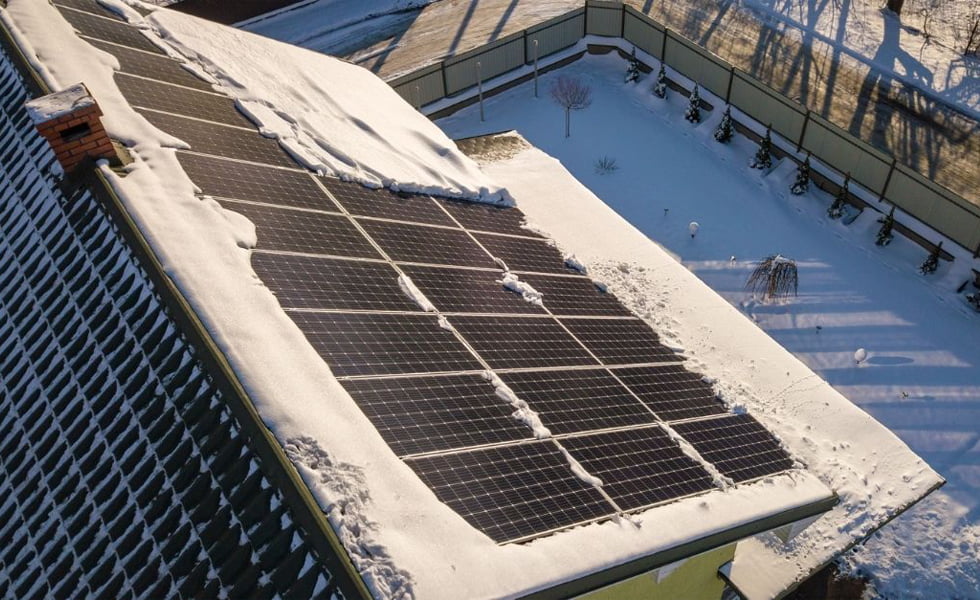
This is by far one of the most frequently asked questions by would-be owners of solar energy systems.
It’s only natural for UK residents to wonder whether solar panels produce energy in the winter.
How long will solar panels continue to generate energy when the temperatures drop and the skies darken?
In a place like the United Kingdom, where the winter is only three months long but might feel like four or five.
However, rest assured that this is merely a popular myth that solar cells are ineffective during the winter. Solar energy is still a dependable and resilient source of renewable energy.
How do solar cells function?
It is necessary to understand how solar cells operate to understand why they can succeed even during the winter months and rainy days.
Solar panels are made up of photovoltaic cells, which are specific components that are often constructed of silicon and are used to generate electricity.
These photovoltaic cells contain electrons that become energised when they contact light particles known as photons.
Within the cell, this energy is transformed into an electrical current that can be used for many purposes.
How well do solar panels operate in cold temperatures?
As we've seen above, solar panels rely upon the sun's light rather than the sun's heat to generate electricity.
Solar cells, like the majority of electrical equipment, function better when the temperature is lower.
It may seem contradictory, but excessive heat might reduce the efficiency of the cells.
A chilly, sunny day will generate more energy from solar cells than a hot, sunny day will yield!
This is due to the difference in energy between the photons from sunshine and the electrons in the solar cell, which causes the solar cell to produce more energy.
The greater the energy differential between the two groups of particles, the greater the amount of power generated.
If you live in colder climates, the difference between them is higher, which means that when the cell is struck by light, more electricity is generated within the cell.
Do solar panels generate green energy in winter?
Solar panels work fine in the winter months. The primary factor which needs to be acknowledged during this time is that there are fewer hours of sunshine on a winter’s day than in the summer.
But you can rest assured that your solar PV installation will not come to a standstill as they are solely light reliant.
Despite this, the months that generate the highest energy yield are between March and October, i.e. the non-winter months.
How does snow affect solar panels?
Snow is a potential drawback for solar panels that can occur when the temperature is exceptionally cold.
Until the snow is cleared, the sun's rays will not reach the solar cells because of the heavy coating of snow covering them.
Due to the flat surface, only a tiny quantity should melt and slip off as the surface heats.
Snow will not cling and pile up on solar panels as it would on other materials because solar panels are tilted towards the sun.
In a climate like the United Kingdom, heavy snow is still a rare event and shouldn't significantly impact solar energy production.
Do solar panels work when it is cloudy and rainy?
The English weather can be unpredictable…and at times, any advantages produced by lower temperatures can be outweighed by the fact that there is less sunlight available during the winter months.
Many people would not be surprised to find that the United Kingdom receives only 30% of the maximum amount of sunshine attainable in a year — with the smallest proportion occurring during the winter months.
The amount of solar energy output that is affected by clouds might vary depending on the density of the clouds. Solar panels will receive less sunlight if clouds are densely packed, as shown below.
Even on less than clear and sunny days, solar cells can still generate a surprising quantity of electricity.
This is because solar cells can operate in either direct or diffuse light. While natural light is solar energy that travels straight from the sun to the ground, diffuse light has been scattered by particles in the atmosphere such as rainy clouds before reaching the earth.
Solar battery storage and winter
Solar battery storage is a great way to make the most of the energy generated in the summer months and those shorter hours in the winter days to use later on for heating.
Even if there is sunshine on a winter's day, it will only last a shorter period of time, but you will want to use that energy generated to operate in the more regular darker hours.
Solar battery storage allows you to do this by holding the energy collected throughout the light hours.
